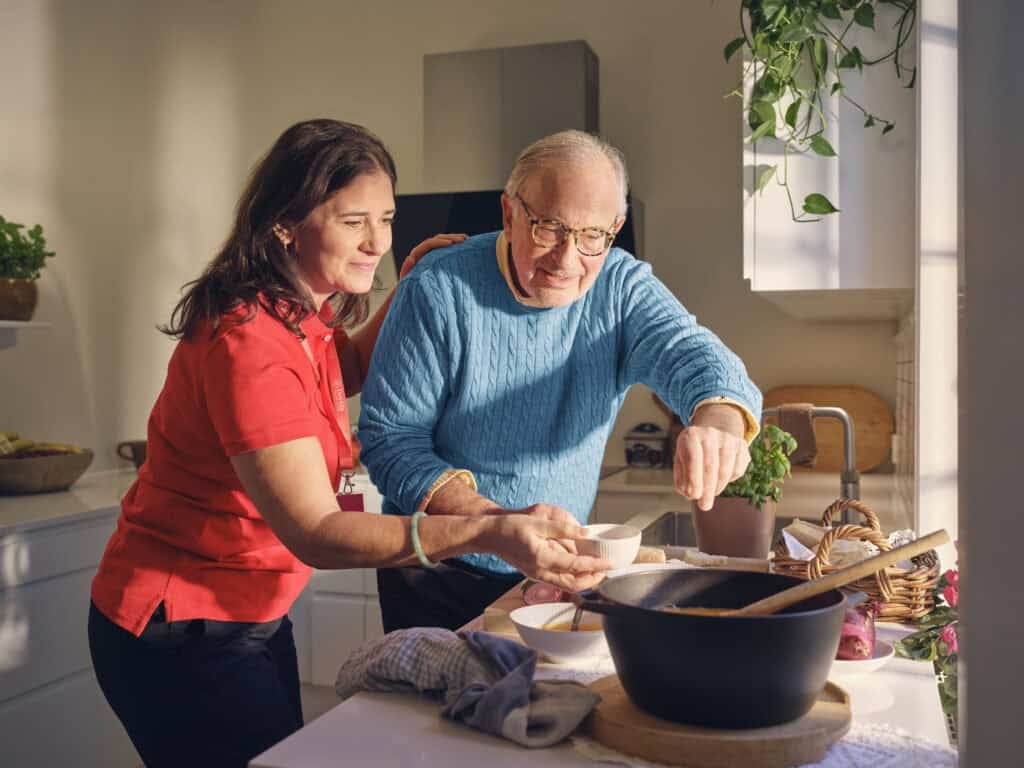News
20 October 2025
Practical Equipment to Support Independence in Parkinson’s Care
Living with Parkinson’s brings unique challenges, but with the right support, many people can continue to live safely and independently at home. Small adaptations and carefully chosen equipment can make everyday tasks more manageable, reduce risks, and support confidence. From exercise tools to kitchen helpers and bedroom aids, practical solutions can be tailored to individual needs and stages of the condition.
At Dovida North Shore and Northern Beaches, our focus is on helping people live well at home, with dignity and comfort. We work closely with health professionals and families to share practical strategies that make a meaningful difference in daily life.
Supporting Movement and Strength
Movement remains important throughout the Parkinson’s journey, and simple exercise equipment can help maintain strength and flexibility. Hand putty and resistance balls are excellent for supporting finger strength and dexterity, while compact pedal exercisers encourage ongoing arm and leg movement from a seated position. These low-impact tools are easy to use at home and can be integrated into short, regular routines that complement guidance from physiotherapists or exercise professionals.
Everyday Help in the Kitchen
Daily tasks such as cooking can be made easier with the right assistive tools. Jar and bottle openers reduce the fine motor effort required when tremor or grip weakness is present. Aids for opening cans can prevent strain, while tipping devices for kettles allow safe pouring without lifting heavy, boiling containers. These practical adaptations lower the risk of spills and burns while preserving autonomy in meal preparation.
Dressing and Home Safety
Simple equipment can help make dressing less strenuous. Sock aids with long handles, dressing sticks, and long-handled reachers reduce the effort needed for tasks like bending or pulling on clothing. Around the home, falls prevention is essential: removing loose mats, choosing rubber-backed options in wet areas, and wearing socks with grip treads or supportive footwear can all make a significant difference to stability and confidence.
Sleep and Bed Mobility
For many people with Parkinson’s, sleep and bed mobility present their own challenges. Low-friction bedding solutions can make turning in bed easier without compromising safety. Options such as the WendyLett Sheet and the WonderSheet feature satin-like central panels that reduce friction, making it easier to reposition, combined with higher-friction sections at the head and foot to help keep pillows and feet anchored. These small but effective changes can improve rest and reduce the strain of moving during the night.
Personalised Support Matters
Ultimately, the best mix of equipment is highly individual. Consulting with an occupational therapist or physiotherapist ensures that choices reflect personal goals, abilities, and the layout of the home. With the right support, people living with Parkinson’s can continue to enjoy greater independence, safety, and quality of life at home.
Parkinson’s Resources and Support in Australia
If you or a loved one are living with Parkinson’s, these organisations offer valuable information, helplines, and local programs:
- Parkinson’s NSW – Provides a free InfoLine (1800 644 189), community support groups, education, and specialist Parkinson’s nurses across NSW.
- Parkinson’s Australia – The national peak body offering advocacy, information, and resources for people with Parkinson’s and their carers.
- Shake It Up Australia Foundation – Funds world-leading Australian research to slow, stop, and ultimately cure Parkinson’s.
- Fight Parkinson’s (Victoria) – Resources and programs that may also support families outside Victoria through online information and education.
Our Commitment
At Dovida North Shore and Northern Beaches, we know that the right equipment is only one part of effective Parkinson’s care. Equally important is the quality of support provided day-to-day. That’s why all our Caregivers receive ongoing, high-level training, equipping them with the knowledge and skills to provide safe, trusted, and compassionate care. By combining professional expertise with practical tools and a focus on dignity, we aim to support each person’s independence and well-being at home.
